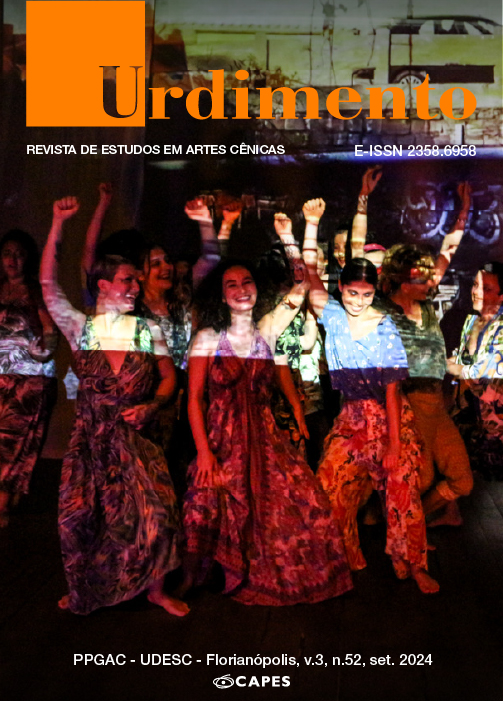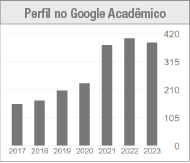A caça infernal aos signos
DOI:
https://doi.org/10.5965/1414573103522024e0205Palavras-chave:
moralidade, teatralidade, narrativaResumo
O texto a seguir trata de “A caça infernal”, contida no Decameron (novela VIII, jornada V) de Boccaccio (s/d). Procurou-se verificar os níveis da narrativa, que vão do conto (dentro do qual acontece um espetáculo teatral) ao quadro de Boticelli com o mesmo título. De um plano narrativo a outro, circulam problemas relativos ao pecado, visto pelos prismas masculino e feminino. O gênero “moralidade” tem seu sentido ampliado, numa variedade de registros cômicos e relativos à sátira, à caricatura, à paródia. Em relevo, o poder masculino impõe-se, mesmo em condições onde a instituição da Igreja condena suas ações. Às mulheres, resta acatar as pedagogias da “virtude”.
Downloads
Referências
AGAMBEN, Giorgio. Profanações. São Paulo: Boitempo, 2007.
AGAMBEN, Giorgio. Nudez. Belo Horizonte: Autêntica, 2015.
BADIOU, Alain. Para uma nova teoria do sujeito. Rio de Janeiro: Relume-Dumará, 1994.
BARTHES, Roland. O rumor da língua. Edições 70, Lisboa, 1987.
BARTHES, Roland. Essais critiques. Paris: Du Seuil, 1964.
BOCCACCIO, Giovanni. Decameron. Lisboa: Europa-América, s.d.
CÉBE, Jean-Pierre. La caricature et la parodie dans le monde roman antique des origines à Juvenal. Paris: Boccard, 1966.
DELEUZE, Gilles. Conversações. Rio de Janeiro: Editora 34, 1992.
DELEUZE, Gilles. Crítica e clínica. São Paulo: Editora 34, 1997.
FOUCAULT, Michel. L’ordre du discours. Paris: Gallimard, 1971.
PINTO, Milton José. As marcas linguísticas da enunciação. Rio de Janeiro: Numen, 1994.
Publicado
Como Citar
Edição
Seção
Licença
Copyright (c) 2024 Urdimento - Revista de Estudos em Artes Cênicas

Este trabalho está licenciado sob uma licença Creative Commons Attribution 4.0 International License.
Declaração de Direito Autoral
Os leitores são livres para transferir, imprimir e utilizar os artigos publicados na Revista, desde que haja sempre menção explícita ao(s) autor (es) e à Urdimentoe que não haja qualquer alteração no trabalho original. Qualquer outro uso dos textos precisa ser aprovado pelo(s) autor (es) e pela Revista. Ao submeter um artigo à Urdimento e tê-lo aprovado os autores concordam em ceder, sem remuneração, os seguintes direitos à Revista: os direitos de primeira publicação e a permissão para que a Revista redistribua esse artigo e seus meta dados aos serviços de indexação e referência que seus editores julguem apropriados.
Este periódico utiliza uma Licença de Atribuição Creative Commons– (CC BY 4.0)




